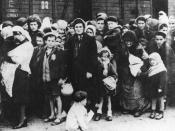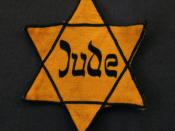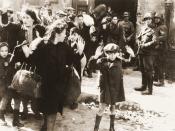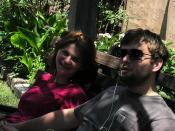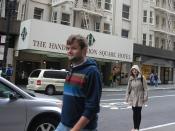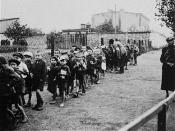When thinking about normal events in history, the Holocaust does not come to mind. Dawid Sierakowiak, a young boy living with his family in the Lódz ghetto facing all of the hardships that the Nazis have to throw at them in Poland before and during World War II. Normalcy is a word that hardly describes the life of Dawid. He had to fight for his life, when a boy of his age should be in school learning and playing sports. He was not able to do things that the other boys his age were doing at that time. The reason, because he was Jewish, along with his family. The Nazis persecuted the Jews and slowly tried to wipe them off the face of the planet. This mass execution and Holocaust of the Jewish population and many others was not normal. The Diary of Dawid Sierakowiak brings its readers right into the heart of the ghetto itself.
Dawid shares with us his daily life and everything that is happening in the world around him. With all this information we are able to see exactly, what is normal and how that affected the Jewish population in Lódz and the Nazis who were trying to persecute them. The normality of loss of hope, the ever lingering idea of death, and how that affected the interpretations that Dawid was putting forth each and everyday about his surroundings.
We will begin with the idea of hope. Hope is a very positive thing that has survived humanity through the ages of time. Every human being has some idea of hope and what they want in their life. The idea of hope was much different to the people living in the Lódz ghetto. They had certain hopes that they wanted to happen to save them from the death and destruction that they were facing. Over the four years that Dawid writes about, it seems that the idea of hope that had kept him sane was beginning to leave him. Dawid talks early in his diary, he writes about the mobilization of the Polish army against the Germans. Mobilization! A great many neighbors have been called. Although terrible scenes of farewell are taking place in the streets of the city, in our building there is a heroic calmàDonÃÂt wait, beat them now (Diary, p. 26). He is sharing the details of the area and how the population is trying to cope with the idea of war. They are hoping for a victory and hoping that the Polish army is able to stop the German advance. Another form of hope shows few pages later when he writes about the early German victory. ÃÂIt doesnÃÂt look like a retreating army. It looks like a regular armyÃÂs troop movement. So weak hope springs up: maybe the Germans will not come. Will the miracle on the Vistula [River] happen again? Will we live to see a second Marne nowà(Diary, p. 35)?One of the important things that kept his hope alive was his attachment to the diary. It comes through in a few lines written on 27 May 1942. This is after he had been considering the idea of deportation, Dawid gave up on the idea, citing among his reasons, ÃÂI would miss my books and 'letters', notes and copybooks. Especially this diaryà(Diary, p. 174). This diary was a sign of hope that his life and the life of his family would not leave this world if they were to perish. It was his confidant and a friend, something that he could share everything with. To Dawid it seemed that the diary gave him some sort of comfort and it helps us to understand what he is feeling. We are more able to interpret his writings on a historical level and to maybe get a sense of what actually happened to them in Lódz ghetto.
Through the rest of the notebooks he seems to really lose hope.
ÃÂHe writes later, Day after day passes. One buys rations, eats the little food there is in them, starves while eating it, and after that keeps waiting obstinately, continuously, and unshakably until the end of the cursed, devilish war; the workshop, home, meals, reading, night and bedbugs and cockroaches, and all over again without end, constantly losing strength, with diminishing efficiency of body and mindÃÂ (Diary, p. 205).
He is sharing his heartache and his indifference. Life slowly seems to drift away from him along with the hope that may have kept them moving from day to day. Hope is slowly lost in the ghettos because things never seem to get better, and as the hope disappears so too does the lives of the people who rely on it to live. In the beginning, hope was normal throughout the ghetto, but as time passed, hope began to be a commodity along with the food that their bodies so desperately needed. In the end he says, ÃÂI feel myself beginning to fall into melancholy. There is really no way out of this for usÃÂ (Diary, p. 268). He has completely given up hope and all seems lost and he stops writing.
He is able to continue by making light of some situations. He uses sarcasm and joking humor, which may either be caused by his scholarly inclined wit to poke fun at the toughest of situations, or because he tries in any way possible to strike a smile upon his face with such distorted humor. At times when he staggers going down a flight of stairs and feels "awful," despite his inability to retain hardly any knowledge, he still attempts to learn more English and even takes on works from Schopenhauer to keep his mind in gear.
Hope has a huge impact on Dawid throughout his diary and what really becomes interesting is how this ties into the idea of normalcy. Hope becomes the only thing that is normal from beginning to end. The only problem is that it gradually changes and dies away leaving Dawid and the people around him without faith.
Throughout his diary the idea of death seems to become more and more indifferent to him or in this case it also gets to the point of normal. The first time he seems indifferent to devastating death becomes evident on 17 December 1939 when he learns about, ÃÂEighty infants frozen to death, were supposedly brought to Lódz from Koluszki todayà(Diary, p. 72). They were the children of the deported Jews. He does not even act as though it is bothersome at all. He basically lets it go and forgets that it happened. Death becomes normal to the Jewish people. People begin to disappear all over. In Notebook 4, on 5 September 1942, his mother is taken and he seems to lose everything he has left.
ÃÂMy most sacred, beloved, worn-out, blessed, cherished Mother has fallen victim to the bloodthirsty German Nazi beast!!! They say that Mom is unrecognizable, which makes her slender chances even less. At times such shudders and heart palpitations come over me that it seems to I'm going insane or delirious. Even so, I'm unable to turn my consciousness away from Mom, and suddenly, as though I divide, I find myself in her mind and body. The hour of her deportation is coming closer, and there's no help from anywhere. nothing will fill up the eternal emptiness in the soul, brain, mind and heart that is created by the loss of one's most beloved personÃÂ (Diary, p. 276).
The reason that it seems that he has lost everything is because really his sister is all that he has left to live for. Most people he has known are away or he has lost contact with. When his father dies later on 6 March 1943, he really does not feel very much pain for his loss, or at least he does not write much about it. He had disliked what the events of the war had turned his father into. His father had changed and had lost what he once was. ÃÂMy unfortunate once-powerful father died today at four in the afternoonÃÂ (Diary, p. 252). He is still afraid of what death has to offer but in all reality he has lost all sense of what is normal at this point. Everything in the world that he once knew is now gone, and life as he knew it has disappeared. His mother has been taken and most surely is dead and his father has died right there in front of him. That is too much for a young boy to face and this is what everyone in the ghetto had to face everyday.
Dawid had begun to interpret the world in a way that he had not before. In the beginning, everything was a bright and full of sunshine. He saw life through the eyes of a child who seemed to know exactly what was coming. Dawid seemed incredibly involved and seemed to understand so much, he was very much filled in on political and social items throughout Europe. He knows about all the diplomacy and the political events that are happening in his sphere and he has picked up on subtle things that influence his hope and thinking. He hopes that the United States will enter the war, ÃÂthe world has caught fire. We are now waiting for England and France to join the war. Perhaps the United States will enter, tooÃÂ (Diary, p. 31).
Dawid never seemed to forget about the things that were happening to him; he just seemed to lose sight of what each thing meant to his life. This is all tied up with the idea of hope and what that means. Since normalcy was such an issue and things changed gradually over time, the Nazi regime did not have to persecute the Jews right there in the ghetto. The Jewish population just learned to understand that it was happening and that it was not going to change. While taking away the food, they were able to stifle and opportunity that the Jewish population had for revolt. Everyone was weak and unable to do even the simplest of task, like walking up stairs. Persecution was taking place all over in Europe and the Jewish population was helpless to fight back. Dawid interprets the ghettoization of the Jews as a temporary event and the allies will be able to defeat the Germans and take over the area, free the Jews.
Interpreting normalcy is something that is extremely difficult when it comes to being under duress. Dawid Sierakowiak was definitely under duress along with the rest of the people in the Lódz ghetto. They were all starving and living with disease and death all around them. What becomes normal over time are things that would seem incomprehensible to most people in the lives we live today. The Jews began to see everything that was happening to them as normal. The Nazi regime was unable to persecute them further because they had already taken everything way. There was nothing left to hurt the Jewish population except to take their lives. That is what happened to Dawid and his family, they lost their lives.
BibliographySierakowiak, Dawid. The Diary of Dawid Sierakowiak Five Notebooks from the Lodz Ghetto. New York: Oxford UP, 1998.
